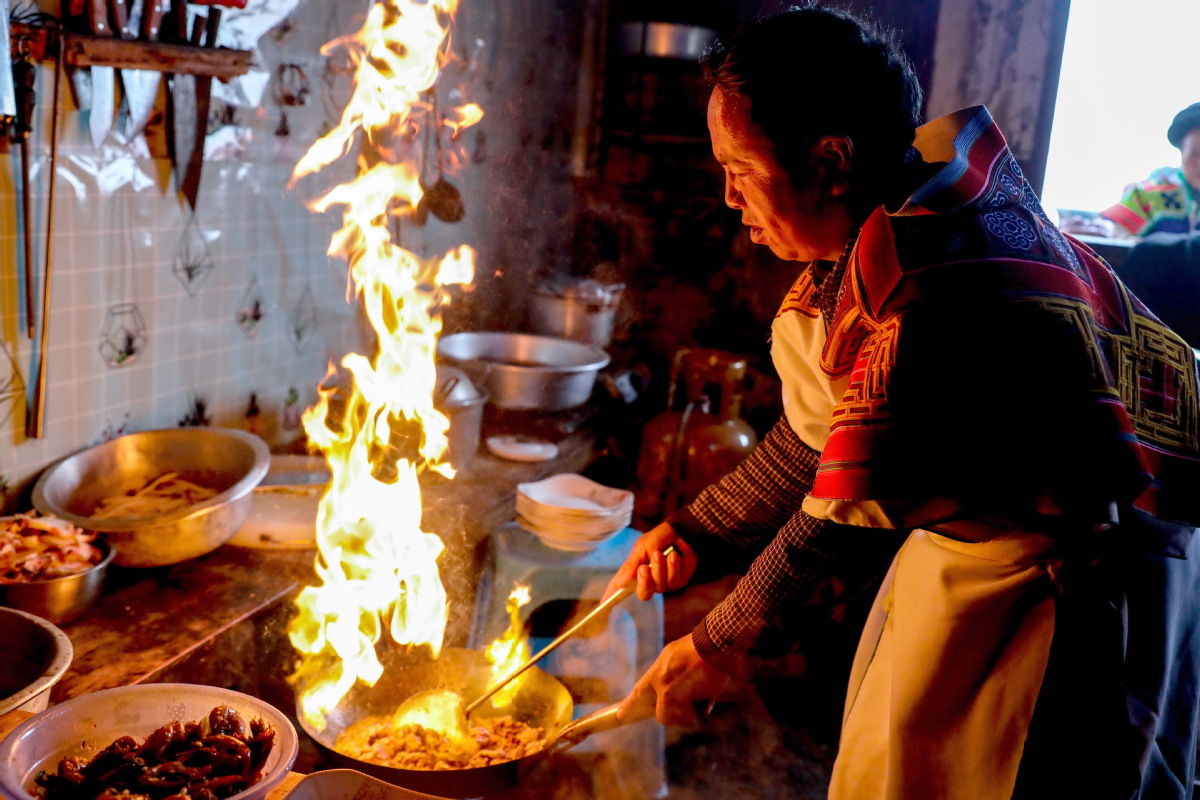Pandemic-related lockdowns lead to rise of wok warriors


Ever since the COVID-19 pandemic broke out, a growing number of Chinese consumers have been spending more time in the kitchen, and nearly half have been inspired by delicious foods they've prepared from recipes seen online. Therefore, content platform operators should think of more business strategies to tap into this growing group, a recent report said.
Beijing-based market consultancy Analysys said in the report that people's cooking habits, many of which were formed during pandemic lockdowns, have continued on even after China has largely brought the contagion under control. More than 60 percent of surveyed consumers still cook for themselves more than five times a week.
Meanwhile, according to the report, 48 percent of the consumers cooked because they were inspired by dishes shared on content platforms such as Xiaohongshu and Douyin. More than 60 percent said that easy and delicious recipes were most likely to arouse their cooking enthusiasm, while 42 percent noted that foods that are visually appealing also prompted them to don aprons.
"The pandemic led to me taking up the habit of cooking at home. Even now, when restaurants are all reopened, I still cook in my spare time. Specifically, when I see some delicious recipes online, I try to make them myself," said Yu Meng, 27, a white collar worker in Beijing.
"User generated content platforms have gradually become an origin of fresh and trendy foods, where consumers-especially young aspiring gourmands-record their cooking processes and share them online. With the trend, consumers have a wider range of dining options. Rather than the previous 'how to cook' search keywords, more and more consumers are turning to 'seeing interesting gourmet dishes and then cooking' and in turn are more motivated to search for related content," said Ma Shicong, a senior analyst at Analysys.
Analysys said more than 75 percent of post-1990s consumers share gourmet-related content online. Among them, more than 70 percent prefer photo sharing, while 35 percent and 2 percent use short videos and livestreaming, respectively. Sharing has become an integral part of enjoying tasty dishes.
Data from Xiaohongshu showed that in 2020, gourmet-related notes shared on the platform surged by 230 percent year-on-year, and the food category has become the third-largest category on the platform, trailing only cosmetics and fashion.
The report from Analysys showed that instead of vertical gourmet online communities, users prefer comprehensive content platforms, and more than half of surveyed young consumers learn to cook from Xiaohongshu.
Judging from what is shared on user-generated content (UGC) platforms, Analysys found that healthy and nutritious foods are becoming new trends as consumers raise their healthcare acumen. In addition, 80 percent of consumers pay attention to dining ambience. They carefully decorate eating environments, use attractive cutlery, elaborately arrange food and take eye-catching photos to make the whole experience richer.
Based on current food consumption trends, industry experts suggest content platforms put more careful thought into how to attract more consumers.
Zhang Shule, a columnist at people.cn, said: "Gourmet sharing on content platforms is based on daily necessities of life, and relies on online communities. UGC platforms have a lot to do to tap into the business."
Ma said, "Because notes shared on UGC platforms are from real users, which are convincing and more easily achieve resonance, gourmet-related content stimulates consumers to buy snacks, raw materials and home appliances."
Huang Tao, an independent expert in public relations, said:"UGC platforms can work with food manufacturers and produce a series of gourmet videos. Therefore, they can attract fixed groups of consumers, and should consider establishing memberships to form win-win business modes."
In addition, as consumers are becoming more diversified, experts recommend UGC platforms to develop gourmet-related content services with more creative options so as to increase people's quality of life.
"From merely pursuing taste to pursuing healthy and happy lifestyles, the value that users seek is constantly being upgraded. UGC platforms should generate more 'browse-cook-eat-share' behaviors, satisfying consumer need for recipe exploring, cooking and sharing within communities, and offering them a more diversified and multilayered experience," Ma said.




































